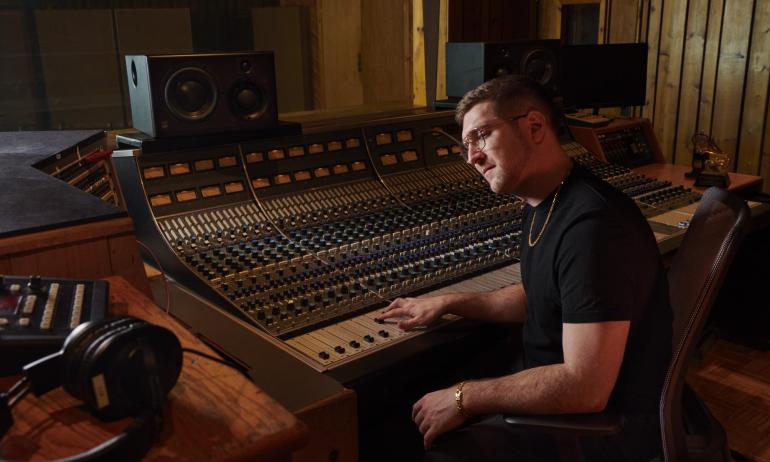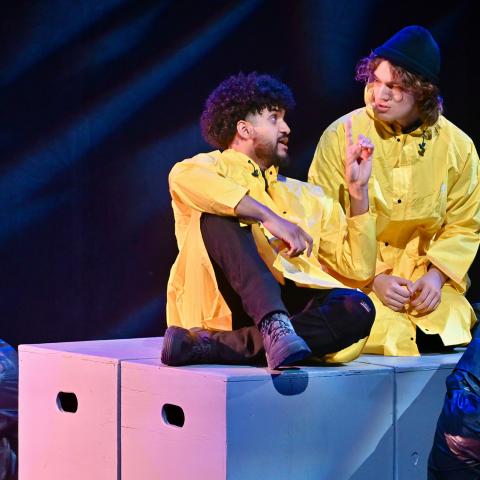Beyoncé, Taylor Swift, and the Soaring Popularity of Concert Films

Taylor Swift's Eras Tour film was a blockbuster at the box office in October, setting the stage for a larger trend in the music and movie industries.
Photo by Getty Images
Ralph Jaccodine, assistant professor in the Music Business/Management Department at Berklee, has held various roles in the industry for over 30 years as a concert promoter, record label owner, concert director, and manager. He has worked with Bruce Springsteen, Kiss, Rush, Hall & Oates, and Foreigner, among other prominent artists over the years. These days, Jaccodine often finds himself in discussions about one artist in particular, Taylor Swift, sharing his insights on the economic impact of her record-breaking Eras Tour in interviews with Bloomberg, CNN, and other outlets.
On the heels of the blockbuster Eras Tour concert film, and right before Beyoncé’s highly anticipated Renaissance World Tour hits theaters on December 1, we talked to Jaccodine about how these movies are setting a trend that the industry will likely see for years to come.
Taylor Swift’s Eras Tour film was a blockbuster and Beyoncé’s Renaissance World Tour film is on track to do similar damage at the box office. Is there anything specific about this moment in time that is driving up the appeal of these types of movies?
There’s few artists that can propel the economy of a market like Taylor Swift. It’s similar when Paul McCartney and Bruce Springsteen tour, but this is bigger and it’s more deeply rooted in families and multiple generations. People are taking vacations and traveling to see artists like Taylor Swift and Beyoncé. The thing I like about the movie idea is that a lot of the movies are going to independent film houses that are community-based, and that’s intentional. It’s helping the theaters out a lot. It doesn’t cost that much money to go to see a concert film, and you don’t have to pay for parking and a hotel like a tour performance. People who can’t get around or are possibly too old or too young to go to a show—this provides an accessible way to see these artists perform. At a Taylor Swift or Beyoncé or Woodstock movie, you’re with a tribe.
Can you describe the novelty of experiencing a concert film in a theater versus an on-demand streaming platform like Netflix?
It’s very simple—the energy is there. You’re with people who love the music and love the art. When you’re in a group of 65,000 people united by music at a stadium, it is religious and it is everything good about life. It’s a really powerful experience. And that does translate to movies, especially niche moves like if you’re a horror film person or if you’re a U2 fan or something like that—you’re with your people. And it’s a beautiful experience. These films are interactive and ideal for fan engagement.
Describe the deals that artists and movie distributors negotiate to make these kinds of films possible.
It’s a whole different kind of economic factor in that you’re not dealing with major ticketing platforms, you’re dealing with theaters and chains directly and you have more leverage. AMC will benefit from these films just like independent theaters. This also gives the artist a chance to negotiate, because you know the theaters are going to make money on concessions and the idea that folks will come back in the future. There’s a whole generation of people—maybe even two, because of Covid—who aren’t going to movie theaters, and the young kids don’t know about that experience and it gets people back into the space, yielding more customers who will see more movies.
Between the Beyoncé and Taylor Swift concert films and the rerelease of Talking Heads’ Stop Making Sense in theaters, is this now a trend? Do you expect to see this from other artists in the future?
I think it’s going to happen all the time now. A lot of artists and their fans are also very conscious of climate change. For the environment and sustainability, it’s a historical document that will live on. You don’t need people to drive hundreds of miles to access it. What we’re seeing is that there will be future concert films of artists who have passed away—that is how estates will make money and continue to get the music out there. With virtual reality and augmented reality, these technologies make these concerts very immersive and unbelievably realistic, and that is technology that’s happening right now.
Do you see any particular advantages or drawbacks of these films in terms of their impact on the movie or film industry itself?
Artists should be doing this—the idea of when they come to town, they soak up a lot of money. That means possibly the smaller clubs or smaller bands . . . may get hurt. But I think, all in all, if Taylor Swift is how people are raising their kids and they see a concert, that means they like music. And if they like Taylor Swift, they might like Dolly Parton or . . . Ed Sheeran. I think it’s good for music. It gets people out seeing the beauty of live music, and technology and AI and augmented reality are going to change that. The idea is to get people away from their screens to see music and buy music. I love the fact that people are going to movie theaters for a great experience. It’s a brave new world and we should be talking about this.




